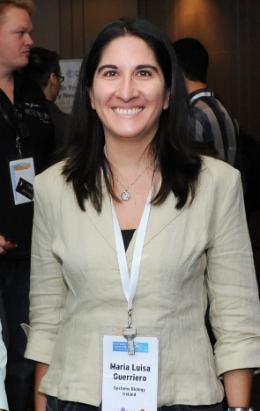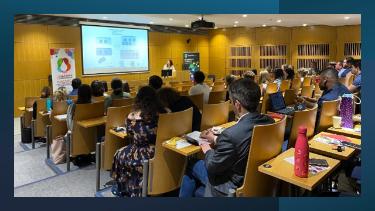SBI Alumni Focus: Dr. Maria Luisa Gurriero, AstraZeneca

Name: Dr Maria Luisa Guerriero
Position: Senior Scientist
Organisation: AstraZeneca
SBI senior researcher 2011-2014
This month we catch up with former SBI researcher Maria Luisa Guerriero to find out about how her SFI Industry Fellowship has led to a career in the pharmaceutical industry.
How did you get your current job at AstraZeneca?
Maria Luisa Guerriero: I applied for an open position. The recruitment process was a two steps process, including a technical skills interview.
At the time the job vacancy was advertised I was hosted by the same company for my SFI Industry Fellowship and I was getting towards the end of my postdoc job with SBI.
Was a career in industry something you had previously considered?
MLG: I had been thinking about that for a while although, having worked in academia all my life, I was not sure what to expect, how it would differ from academia and if I would like it. I guess the SFI fellowship experience gave me the chance to see the industry world with my eyes and decide if it was a world I would see myself being part of.
What are the differences between working in academia and industry?
MLG: The main difference I noticed is that industrial research is faster and more collaborative. Results, whether positive or negative, need to be produced quickly because the rest of the team, or even the decision to stop a project all together, is dependent on them; that also means everybody is generally involved in many projects at the same time. On the negative side, I guess there is a bit more bureaucracy, such as monthly reports to write and townhall meetings to attend. Also, publications and participation to workshops/conferences are still part of the job, but not the main objective.
Do you think more young researchers should consider industry as an option?
MLG: Well, given the lack of career opportunities in academia I think a career in industry is something many PhD students and postdocs will have to consider, whether they want it or not!
But also, more important, I think academics should stop looking at industrial applied research as a second choice career option, as something not as exciting as academic research. Maybe that was the case in the past, but I don't think that is true today. Personally, knowing that my little contribution is directly helping to develop a new life changing medicine is much more exciting than knowing that publishing a journal paper is the final goal of my research!
Is there more that universities can do to prepare junior researchers for careers in industry?
MLG: Opportunities like the SFI industry fellowship are ideal. More industry internships for PhD students, collaborations, academy/industry co-funded and co-supervised PhD and postdoc positions would all be good. Even just inviting industry research leaders to academic workshops and conferences would be a way to expose students and academics in general to the world of industrial research.
What are you working on at the moment?
MLG: I am working on a few drug projects for oncology and diabetes. I am in the computational biology group and we support the chemistry and biosciences teams helping them to address open questions using modelling and bioinformatics methods. One of my projects, for instance, is about modelling receptor internalisation and recycling to help to develop a strategy for receptor-mediated targeted delivery of a drug into beta-cells. Another project is about modelling the competition of different proteins and corepressors with a drug targeting a repressor complex to see if that could explain the big dropoff in drug potency that is observed in cellular assays compared to biochemical assays.
The Science Foundation Ireland Industry Fellowship programme facilitates the bi-directional movement of academic and industry researchers, stimulating excellence through knowledge transfer and training, thereby building critical mass in areas of strategic importance for Ireland and enabling economic and societal challenges to be tackled. The fellowships enable access for researchers to new technology pathways and standards and facilitate training in the use of specialist research infrastructure.
Deadlines for proposal submission for the 2015 programme are 3 June and 3 December. For further information see the SFI website.

